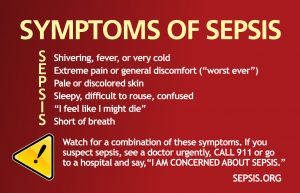Spotlight on sepsis
The UK sepsis trust and the NHS are currently campaigning to spread awareness to parents to help spot the signs and symptoms of sepsis. Over the past month sepsis has been a popular subject in our parent first aid classes, as parents have seen sepsis awareness posters on social media. Here are some of the questions that have been asked.
What is sepsis?
Sepsis is a rare but serious complication of an infection.
The infection can start anywhere in the body.
It could be in the chest, stomach, kidneys or on the skin or anywhere in the body.
What does sepsis do to the body?
If sepsis is not treated quickly, sepsis can lead to shock and multiple organ failure which is life threatening.
This is why it is so important to spot the signs and symptoms of sepsis early and seek medical advice immediately.
If sepsis is diagnosed early or quickly it can be treated and a full recovery can be made.
What are the symptoms to look out for?
Advice from the UK Sepsis Trust is that any child who is:
- Is breathing fast
- Has a convulsion or fit
- Looks mottled, bluish or pale
- Has a rash that does not fade when you press it
- Is very lethargic or difficult to wake up
- Feels abnormally cold to touch
Might have sepsis.
Phone 999 and ask if it could be SEPSIS
Other signs to watch out for are if a child:
- Is not feeding/eating
- Is vomiting repeatedly
- Has not had a wet nappy (or wee) for 12 hours
- Is deteriorating
Call 111 or see your GP, if the child is getting worse don’t hesitate to call 999 or go to A&E
As with any childhood illness, always seek medical assistance from your GP or 111 as soon as possible.
Trust your parental instinct and seek further medical assistance if your child gets worse.
If you want to learn more about childhood illnesses we cover them in our 2 hour first aid for parents class, we also show you what to do in an emergency or if an accident happened.
Marie Gale runs Daisy First Aid Northampton and Kettering. Contact marie@daisyfirstaid.com for more details.
http://www.nhs.uk/conditions/Blood-poisoning/Pages/Introduction.aspx#symptoms-children

